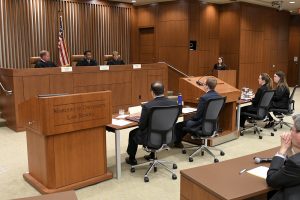Israel Reflections 2019—Shared Society
One key focus of our trip was all of the organizations working on shared society across groups in Israel. Our day of shared society started at Sindyanna of Galilee with a Za’atar workshop. Sindyanna of Galilee is a non-profit organization that employs Arab and Jewish women who aim to create a peaceful coexistence between the two cultures. The students were able to create their own Za’atar after hearing from employees on how they strive to create peace. (This was delicious! And all available on Amazon too…)
 We then headed towards Nazareth to have lunch and see The Basilica of Annunciation. When we arrived there was a service in progress in front of the Grotto of the Annunciation. For student Margaret Spring it was one of the most breathtaking experiences she has ever had in a church. “Being at one of the most sacred Christian sites in the world while a congregation was singing is something that I will never forget.”
We then headed towards Nazareth to have lunch and see The Basilica of Annunciation. When we arrived there was a service in progress in front of the Grotto of the Annunciation. For student Margaret Spring it was one of the most breathtaking experiences she has ever had in a church. “Being at one of the most sacred Christian sites in the world while a congregation was singing is something that I will never forget.”
Our next stop was Givat Haviva.  Givat Haviva is dedicated to promoting mutual responsibility, civic equality and cooperation between divided groups in Israel as the foundation for building a shared future and shared society—critical elements of a sustainable and thriving Israeli democracy. While there, we visited the divided city of Barta’a.
Givat Haviva is dedicated to promoting mutual responsibility, civic equality and cooperation between divided groups in Israel as the foundation for building a shared future and shared society—critical elements of a sustainable and thriving Israeli democracy. While there, we visited the divided city of Barta’a.
Student Mercy De La Rosa wrote a thoughtful self-reflection that is shared in full about her experience at Givat Haviva and how that compared to her childhood in El Paso near the Mexican at the Texas border.
Walking through the rolling green lawns of Givat Haviva, it was hard not to draw comparisons to college campuses across America with laughing students stretched out on beautiful trimmed lawns. This, however, is no idyllic American campus. Instead here Muslims and Jews strive to work together bridging differences and embracing commonalities. Clearly underneath the beautiful surface there has been a lot of hard work in community building and deep difficult conversations. Armed with cookies, coffee, and a razor-sharp witted Welsh guide we trekked to the Barta’a….Driving up to the town, I never imagined what was in wait for me. Driving up Lydia shared a heartbreaking story of how she often felt like a person divided, split between friendships on what at first glance seems like diametrically opposed sides. In hindsight, that story should have prepared me for the painfully wonderful parallels that would be presented between my home city of El Paso Texas and Barta’a. As we walked through the city, I was vaguely reminded of downtown El Paso until we hit the market area where all I could see was memories of Juarez. Granted it has been at this point almost 12 years since I have been to Juarez, but to me it felt like someone had just put up Arabic signs instead of ones in Spanish. As we ascended into the mountains to better see the divide, it was like looking out from Scenic Drive where you can see the connection of the two downtowns. From that viewpoint almost seamlessly merging into one another. On closer examination you can see the border but looking at it from a distance it is more a feeling than articulable distinguishing characteristics….This small town shook me to my core, serving as a stark reminder that though we may travel far from home sometimes it is the familiar that frightens and motivates us the most.
[Cross-posted at Indisputably.]



 Congratulations to the winners of the 2019 Jenkins Honors Moot Court Competition, Brooke Erickson and Micaela Haggenjos. Congratulations also go to finalists Luis Gutierrez and Nicholas Wanic. Erickson and Haggenjos additionally won the Franz C. Eschweiler Prize for Best Brief, and Erickson won the
Congratulations to the winners of the 2019 Jenkins Honors Moot Court Competition, Brooke Erickson and Micaela Haggenjos. Congratulations also go to finalists Luis Gutierrez and Nicholas Wanic. Erickson and Haggenjos additionally won the Franz C. Eschweiler Prize for Best Brief, and Erickson won the 